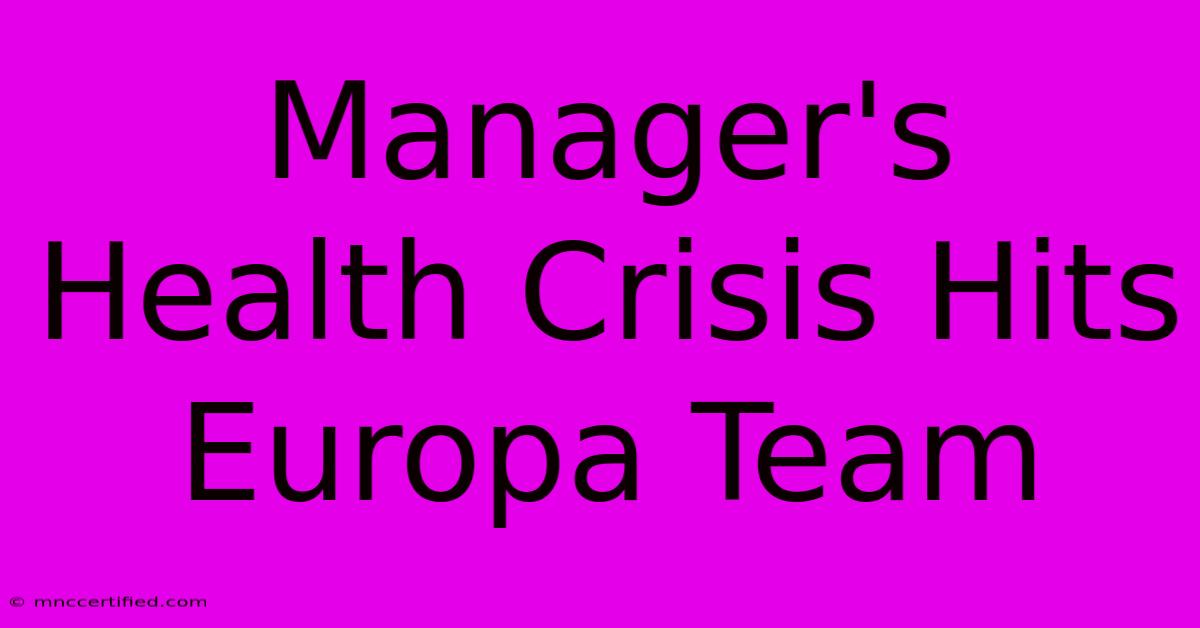Manager's Health Crisis Hits Europa Team

Table of Contents
Manager's Health Crisis Hits Europa Team: Impact and Response
A health crisis affecting a key manager can send shockwaves through any organization, and the impact on Europa Team is no exception. This article explores the potential consequences of such a situation, examining the immediate reactions, long-term implications, and strategies for effective crisis management. We'll also delve into the importance of employee well-being and corporate responsibility in navigating these challenging times.
Understanding the Immediate Impact
When a manager experiences a serious health issue, the immediate effects on the Europa Team can be significant. These include:
-
Operational Disruption: The absence of a key manager can lead to project delays, workflow bottlenecks, and a general slowdown in productivity. Depending on the manager's responsibilities, certain projects might come to a complete standstill. This operational disruption can have a ripple effect throughout the entire team.
-
Employee Uncertainty and Anxiety: Uncertainty is a major stressor. Employees may experience anxiety about the manager's well-being, their own job security, and the future of ongoing projects. This uncertainty can significantly impact team morale and performance.
-
Communication Breakdown: A lack of clear communication from leadership during a crisis can exacerbate existing anxieties. Effective communication is crucial to maintaining transparency and keeping the team informed, even if the information is limited due to privacy concerns.
-
Increased Workload: The remaining team members might be forced to shoulder a heavier workload to compensate for the absent manager's responsibilities. This increased workload can lead to burnout and decreased job satisfaction.
Long-Term Implications for Europa Team
The effects of a manager's health crisis can extend far beyond the immediate aftermath. The long-term implications for Europa Team could include:
-
Loss of Institutional Knowledge: A seasoned manager often possesses valuable knowledge and experience that is difficult to replicate. Their absence can result in a loss of institutional knowledge, potentially hindering future projects and decision-making.
-
Reputational Damage (in some cases): Depending on the circumstances, a prolonged absence of a key manager could negatively impact the team's reputation, particularly if it leads to missed deadlines or unmet client expectations. Reputational damage can be challenging to repair.
-
Financial Impacts: Project delays and decreased productivity can lead to significant financial losses for the company. This financial impact needs to be carefully assessed and managed.
-
Team Morale and Retention: If the crisis is not handled effectively, team morale can suffer, potentially leading to higher employee turnover. Employee retention is crucial for maintaining team stability and productivity.
Strategies for Effective Crisis Management
Responding effectively to a manager's health crisis requires a multifaceted approach:
-
Immediate Support System: Establish a strong support system for both the affected manager and the team. This may include providing resources for the manager and their family, as well as offering counseling or stress management programs for employees.
-
Clear Communication Plan: Develop a comprehensive communication plan to keep the team informed about the situation, while respecting the manager's privacy. Regular updates, even if they are limited, can help reduce anxiety and maintain transparency.
-
Delegation and Workflow Adjustments: Reassign responsibilities and adjust workflows to minimize disruption. This might involve temporarily reassigning tasks, bringing in additional support, or prioritizing projects.
-
Succession Planning: Having a clear succession plan in place can help mitigate the impact of unforeseen absences. This ensures that essential tasks can continue to be performed even in the absence of a key manager.
-
Focus on Employee Well-being: Prioritize the well-being of the entire team. Offer support services, encourage open communication, and create a supportive work environment. Employee well-being is paramount during and after a crisis.
Conclusion: Prioritizing Health and Resilience
A manager's health crisis presents a significant challenge, but with effective planning and a strong focus on communication and employee well-being, Europa Team can navigate this difficult situation. By prioritizing support, transparency, and proactive strategies, the team can minimize disruption, maintain morale, and emerge stronger from this experience. This situation underscores the importance of robust crisis management plans and a culture that values both employee health and organizational resilience.

Thank you for visiting our website wich cover about Manager's Health Crisis Hits Europa Team. We hope the information provided has been useful to you. Feel free to contact us if you have any questions or need further assistance. See you next time and dont miss to bookmark.
Featured Posts
-
Public Opinion Lions Bears Special
Nov 29, 2024
-
Walmart Black Friday Key Deals Found
Nov 29, 2024
-
Europa League Man Utd Wins 3 2 Thriller
Nov 29, 2024
-
Konate Injury Update Liverpool Receive Hope
Nov 29, 2024
-
Car Insurance Quotes Utica Ny
Nov 29, 2024